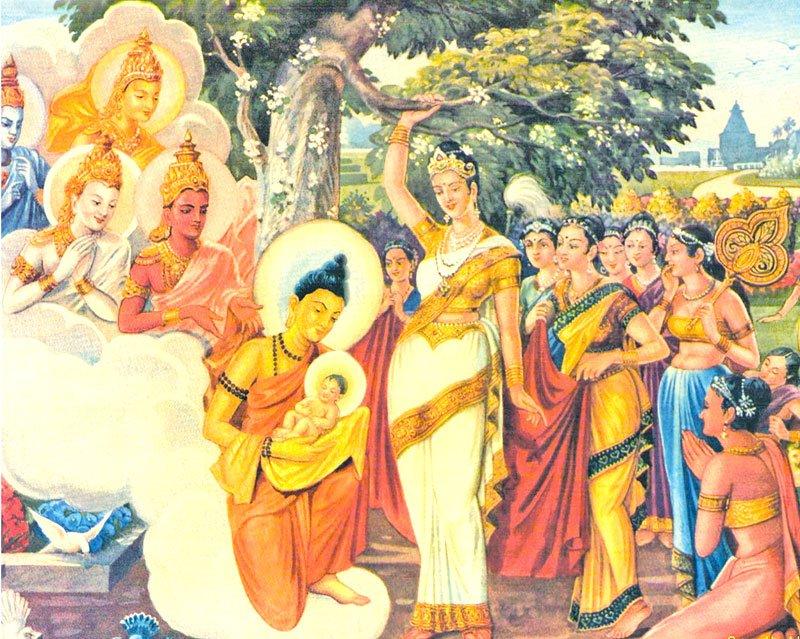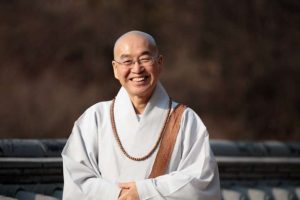At this time of strife, the Buddha’s teachings of tolerance, compassion, and service to humanity are a source of solace and strength. As we navigate the path to a better future, let us seize the spirit of Vesak.
UN Secretary-General António Guterres, 2023

As Buddhists around the world celebrated Vesak on 5 May, we find ourselves called to reflect on the significance of this holiday and the life it honors. Vesak, also known as Buddha Jayanti, Buddha Purnima, or simply as the Buddha’s Birthday, commemorates the birth (Skt: jati), awakening (Skt: bodhi or sopadhishesa-nirvana), and death (Skt: mahaparinirvana) of Shakyamuni Buddha.
But the holiday is not celebrated for the sake of the Buddha, but instead for his message of the universal capacity in all beings for wisdom and compassion. We celebrate these three life events in one day because they remind us of a biographical arc that we too can follow. We too were born and we too will pass away. We remember that the Buddha was not a supernatural being. But between these two events, he followed an arduous path that led, ultimately, to his awakening.
The realization and mental transformation known as awakening is the ultimate goal for all Buddhists. Some will undertake a path similar to the historical Buddha, Siddhartha Gautama, abandoning the householder life and living simply for many years. Others will remain householders and dedicate whatever wealth they can afford to a monastery in the hope of meritorious karma. Others will take countless other paths. As Buddhism developed in India and beyond, it came to offer a great many paths—all ostensibly leading to the same eventual awakening.
While it can be difficult to pick out any particular core to the Buddha’s teachings, the Four Noble Truths seems to be a worthy candidate:
The truth of suffering
The origin of suffering
The cessation of suffering
The path leading to the cessation of suffering
One of the finest ways of describing duhkha is as a wheel out of kilter. For the modern reader, perhaps the idea of a flat tire fits best. It is not that everything always is terrible, but rather that there is a perceptible sense that things very well could be better. Even our joys contain duhkha insofar as they will end and, as we are ignorant of this, we tend to cling to them instead of letting go.
This clinging or thirsting for particular experiences is the origin of suffering. It is as deeply rooted in us as thirsting for water. We may not notice it for a while, but it comes back again and again, forcing us to quench it in whatever way we can.
These are the two negative truths. They are the tough truths we must accept in our lives. But they are not the end of the Buddhist story.
The first good news is that there is a cessation of suffering. This is possible. We, too, can achieve the awakening that the Buddha achieved 2,500 years ago. And finally, there is the long and demanding path leading to the cessation of suffering. These are the positive truths. Like two wings on a bird, we need both the positive and the negative sides to fly.
In our modern world, filled with constant news from around the globe, rapid-fire notifications from the apps on our smartphones, and seemingly endless political uncertainty, the life of the Buddha and the Four Noble Truths that he taught can serve as a powerful reminder of our paths as Buddhists—varied as they may be. In many Buddhist cultures, this story is taught often. Vesak simply provides an opportunity to dive in to the story as deeply as one can. We can follow this journey by way of a video by Sergey Roy, documenting the streets of Colombo, Sri Lanka, on Vesak in 2019:
If we have the time, we might also watch this lantern festival parade from Seoul in 2022, to see the performance of bright lights, colorful costumes, masks, dancing, chanting, and more. Art here serves the purpose of drawing us into the story of the Buddha, the awakened one who set forth the path for the rest of us to follow. It can also tie us more deeply to our culture if we are Korean or—as above—Sri Lankan. If we come from another culture, we can honor and give thanks to the millions of people who have come before us, maintaining and developing the Buddhasasana, the living traditions that allow us to encounter Buddhism in our own lives.
As UN Secretary-General António Guterres said in his message this year: “The ideals celebrated on this sacred day have a deep resonance with the goals of our United Nations: understanding among peoples, the pursuit of harmony, the promotion of peace.” (United Nations)
As a human race, our mutual understanding is still in its infancy. Just 300 years ago, wars raged across most continents and few people cared or possessed the resources to learn about different people. Much has changed. And while wars continue, we understand better the futility of conquest.
Ultimately, the harmony and peace we seek must first be cultivated within. This, too, is the Buddha’s message and his gift to the world. We cannot help but be influenced by the world around us, and we all want to change things in ways that we think we know best, but as long as our own minds remain confused, driven by greed or aversion, our efforts will always fall short.
Clearing away the webs of greed, aversion, and ignorance is the work of the Buddhist path. On this holiday we celebrate the awakened one and the trust that we too can do the work needed to attain the goal. May we all strive diligently and with joy.
Read more
Importance of Vesak (Sunday Observer)
The Secretary-General Video Message on the day of Vesak, the day of the Full Moon (United Nations)
Significance of Vesak Festival (Daily News)
Related features from BDG
From Vesak to Solstice: Connecting Through Festival
Buddhistdoor View: A Buddhist Response to the Vatican’s Vesak Message
A Sharing of Values: Vesak Reflections in Thailand
Related news reports from BDG
Dalai Lama Points to the Heart of the Buddhadharma as Buddhists Around the World Observe Vesak
Indonesian Buddhists to Celebrate Vesak at Borobudur Temple
IBC Hosts Global Online Vesak Celebration Dedicated to Relief from COVID-19
Dalai Lama Urges Greater Inter-religious Understanding in Vesak Message
17th United Nations Day of Vesak Event Canceled over Coronavirus Risk
Two Koreas Celebrate Vesak With Joint Prayer











